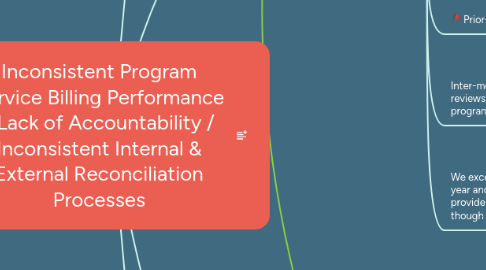
1. People
1.1. Community leadership doesn't have a good understand or visibility into claiming
1.1.1. Denials and balance past due isn't included in some of the reporting.
1.1.1.1. Productivity may be over inflated. Later this shows up on a income statement as a surprise.
1.1.1.2. Don't get a monthly claim denial and adjudication report.
1.2. Some staff believe that hitting the 5 hrs x 5 days a week is not possible
1.2.1. Some programs haven't hit the target 5x5 is a really long time or are awash with low service billing levels.
1.2.2. Data definitions around the metrics are not clear. Common questions around PDL, % of available...
1.3. Don't have reconciliation specialists in each region where this is important.
1.3.1. San Bernardino OCs do allot of this.
1.3.1.1. Can be inconsistent
1.3.2. Santa Barbara senior financial analyst does the reconciliation
1.3.3. Limited staff to approve notes
1.3.3.1. Delays timelyness
1.3.3.2. Training for note approval impacts timeliness
2. Processes
2.1. Credentialing
2.1.1. License changes and providers don't update
2.1.2. Providers aren't setup properly initially
2.1.3. We don't check across regions and levels of care taxonomy's line up. (taxonomy cross walk)
2.1.4. Telecare job description don't match MHRS job descriptions.
2.1.5. PAVE registration enables billing to medi-cal
2.1.5.1. Each licensed provider needs to apply individually. Must be renewed annually
2.1.5.1.1. Do we have a process for this? NO
2.1.5.2. We don't check for this on licensed new hires. Or its inconsistent across programs.
2.2. Large proportion of services get categorized as non-billable
2.2.1. Staff go out and can't connect with clients. This counts towards for productive time isn't claimable from mediCAL
2.2.1.1. Some staff may pad their productive time with this.
2.2.1.2. Some clients are very difficult to find. Searching eats allot of time.
2.2.1.3. Clients go into jail or we lose contact with them and later find they've lost medical coverage.
2.2.1.3.1. They lose coverage due to going to jail
2.2.1.3.2. They don't response to correspondence
2.2.2. In some counties non-billable's are not submit-able. In LA many of these service never get submitted because they can't be claimed.
2.3. Prior-auths for AZ and influx for Medicaid
2.4. Inter-month service billing performance reviews help programs hits targets. Not all programs do this.
2.4.1. We haven't educated the staff as to why this is critical
2.4.2. We struggle to make this very simple for our administrators.
2.4.3. We haven't create a culture of efficiency
2.5. We exceed K-max prior to the end of the year and you're obligated to continue to provide care and submit claims even though client has maxed their insurance.
2.5.1. We don't educate program leadership on the nuance of their contract. They then discover this when a contractual hits.
3. Policy & Governance
3.1. LImitation on who can provide services that we can get reimbursed for. (peer certification, education level)
3.1.1. Peer certification
3.1.1.1. CA is lagging behind other states
3.1.2. Education level of the staff. Key services are out of scope of practices.
3.1.2.1. Inconsistency across counties of what is allowed.
3.1.3. Licenseing requirements
3.1.4. Scope of Practice has changed
3.1.5. Staff and unclear on some of the nuances related to coding and billing.
3.1.5.1. Staff turnover creates knowledge leakage around some of these nuances
3.1.5.2. In some programs Quality does a high touch review to insure a demonstrated competencies in documentation. This model doesn't exist everywhere.
3.2. Unclear policy on note approval
3.2.1. Approval / co-signing
3.2.1.1. Protocol is largely subjective and varies from approver to approver from program to program
3.2.1.2. Timelines for approval and unclear. This can cause billing to be delayed.
3.2.1.3. Don't always have a qualified approved for a particular scope of practice. This causes delays in approval.
3.2.2. Trainiee (substance use counsellor) required co-signature
3.2.2.1. In WA for SUD supervisor has to approve. There was a limit on how many people you could approve for. Folks may be a bit confused on what the new policy is.
3.3. Calculation and accounting for Group Minutes used to be a challenge. In Orange this seems to have alleviated over the years.
4. Systems
4.1. Many counties don't provide data to reconcile against
4.2. Each county has inconsistent service coding. They don't crosswalk universally.
4.2.1. Service billing cross walks exist but aren't easy to use.
4.2.2. Some counties interpret which services are billable differently.
4.3. Electronic visit verification is going to create logistical challenges for getting paid. Additional validation requirements may hinder our ability to get paid.
4.4. Service intermix doesn't align to contractual requirements
4.4.1. Service intermix wasn't available before in Avatar. It is now. Sometimes you hit your target but over produced one type of service.
4.4.2. We don't have a contract management database that lets us know what the contract service intermix requirements are by contract.
